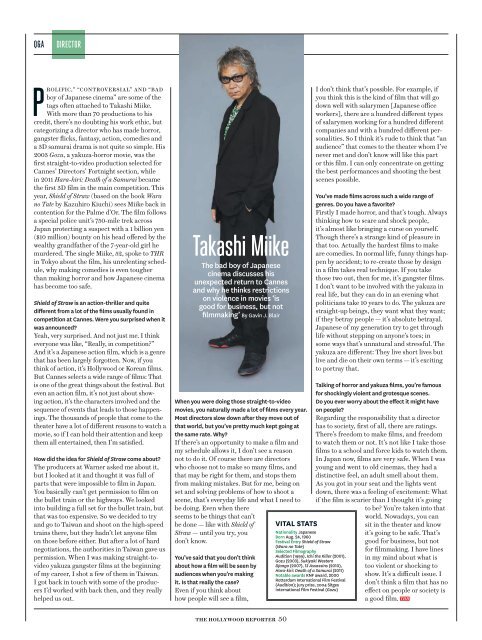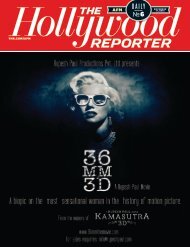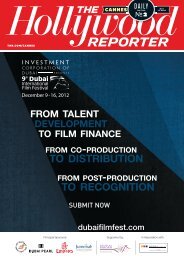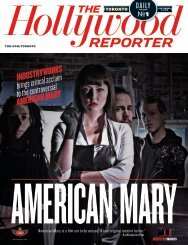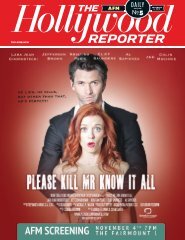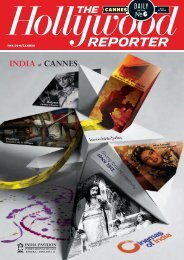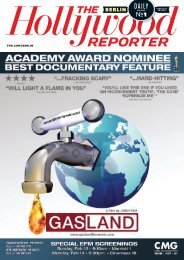Create successful ePaper yourself
Turn your PDF publications into a flip-book with our unique Google optimized e-Paper software.
Q&A<br />
DIRECTOR<br />
PROLIFIC,” “CONTROVERSIAL” AND “BAD<br />
boy of Japanese cinema” are some of the<br />
tags often attached to Takashi Miike.<br />
With more than 70 productions to his<br />
credit, there’s no doubting his work ethic, but<br />
categorizing a director who has made horror,<br />
gangster flicks, fantasy, action, comedies and<br />
a 3D samurai drama is not quite so simple. His<br />
2003 Gozu, a yakuza-horror movie, was the<br />
first straight-to-video production selected for<br />
Cannes’ Directors’ Fortnight section, while<br />
in 2011 Hara-kiri: Death of a Samurai became<br />
the first 3D film in the main competition. This<br />
year, Shield of Straw (based on the book Wara<br />
no Tate by Kazuhiro Kiuchi) sees Miike back in<br />
contention for the Palme d’Or. <strong>The</strong> film follows<br />
a special police unit’s 750-mile trek across<br />
Japan protecting a suspect with a 1 billion yen<br />
($10 million) bounty on his head offered by the<br />
wealthy grandfather of the 7-year-old girl he<br />
murdered. <strong>The</strong> single Miike, 52, spoke to THR<br />
in Tokyo about the film, his unrelenting schedule,<br />
why making comedies is even tougher<br />
than making horror and how Japanese cinema<br />
has become too safe.<br />
Shield of Straw is an action-thriller and quite<br />
different from a lot of the films usually found in<br />
competition at Cannes. Were you surprised when it<br />
was announced?<br />
Yeah, very surprised. And not just me. I think<br />
everyone was like, “Really, in competition?”<br />
And it’s a Japanese action film, which is a genre<br />
that has been largely forgotten. Now, if you<br />
think of action, it’s <strong>Hollywood</strong> or Korean films.<br />
But Cannes selects a wide range of films: That<br />
is one of the great things about the festival. But<br />
even an action film, it’s not just about showing<br />
action, it’s the characters involved and the<br />
sequence of events that leads to those happenings.<br />
<strong>The</strong> thousands of people that come to the<br />
theater have a lot of different reasons to watch a<br />
movie, so if I can hold their attention and keep<br />
them all entertained, then I’m satisfied.<br />
How did the idea for Shield of Straw come about?<br />
<strong>The</strong> producers at Warner asked me about it,<br />
but I looked at it and thought it was full of<br />
parts that were impossible to film in Japan.<br />
You basically can’t get permission to film on<br />
the bullet train or the highways. We looked<br />
into building a full set for the bullet train, but<br />
that was too expensive. So we decided to try<br />
and go to Taiwan and shoot on the high-speed<br />
trains there, but they hadn’t let anyone film<br />
on those before either. But after a lot of hard<br />
negotiations, the authorities in Taiwan gave us<br />
permission. When I was making straight-tovideo<br />
yakuza gangster films at the beginning<br />
of my career, I shot a few of them in Taiwan.<br />
I got back in touch with some of the producers<br />
I’d worked with back then, and they really<br />
helped us out.<br />
Takashi Miike<br />
<strong>The</strong> bad boy of Japanese<br />
cinema discusses his<br />
unexpected return to Cannes<br />
and why he thinks restrictions<br />
on violence in movies ‘is<br />
good for business, but not<br />
filmmaking’ By Gavin J. Blair<br />
When you were doing those straight-to-video<br />
movies, you naturally made a lot of films every year.<br />
Most directors slow down after they move out of<br />
that world, but you’ve pretty much kept going at<br />
the same rate. Why?<br />
If there’s an opportunity to make a film and<br />
my schedule allows it, I don’t see a reason<br />
not to do it. Of course there are directors<br />
who choose not to make so many films, and<br />
that may be right for them, and stops them<br />
from making mistakes. But for me, being on<br />
set and solving problems of how to shoot a<br />
scene, that’s everyday life and what I need to<br />
be doing. Even when there<br />
seems to be things that can’t<br />
be done — like with Shield of<br />
Straw — until you try, you<br />
don’t know.<br />
You’ve said that you don’t think<br />
about how a film will be seen by<br />
audiences when you’re making<br />
it. Is that really the case?<br />
Even if you think about<br />
how people will see a film,<br />
VITAL STATS<br />
Nationality Japanese<br />
Born Aug. 24, 1960<br />
Festival Entry Shield of Straw<br />
(Wara no Tate)<br />
Selected Filmography<br />
Audition (1999), Ichi the Killer (2001),<br />
Gozu (2003), Sukiyaki Western<br />
Django (2007), 13 Assassins (2010),<br />
Hara-kiri: Death of a Samurai (2011)<br />
Notable awards KNF award, 2000<br />
Rotterdam International Film Festival<br />
(Audition); jury prize, 2004 Sitges<br />
International Film Festival (Gozu)<br />
I don’t think that’s possible. For example, if<br />
you think this is the kind of film that will go<br />
down well with salarymen [Japanese office<br />
workers], there are a hundred different types<br />
of salarymen working for a hundred different<br />
companies and with a hundred different personalities.<br />
So I think it’s rude to think that “an<br />
audience” that comes to the theater whom I’ve<br />
never met and don’t know will like this part<br />
or this film. I can only concentrate on getting<br />
the best performances and shooting the best<br />
scenes possible.<br />
You’ve made films across such a wide range of<br />
genres. Do you have a favorite?<br />
Firstly I made horror, and that’s tough. Always<br />
thinking how to scare and shock people,<br />
it’s almost like bringing a curse on yourself.<br />
Though there’s a strange kind of pleasure in<br />
that too. Actually the hardest films to make<br />
are comedies. In normal life, funny things happen<br />
by accident; to re-create those by design<br />
in a film takes real technique. If you take<br />
those two out, then for me, it’s gangster films.<br />
I don’t want to be involved with the yakuza in<br />
real life, but they can do in an evening what<br />
politicians take 10 years to do. <strong>The</strong> yakuza are<br />
straight-up beings, they want what they want;<br />
if they betray people — it’s absolute betrayal.<br />
Japanese of my generation try to get through<br />
life without stepping on anyone’s toes; in<br />
some ways that’s unnatural and stressful. <strong>The</strong><br />
yakuza are different: <strong>The</strong>y live short lives but<br />
live and die on their own terms — it’s exciting<br />
to portray that.<br />
Talking of horror and yakuza films, you’re famous<br />
for shockingly violent and grotesque scenes.<br />
Do you ever worry about the effect it might have<br />
on people?<br />
Regarding the responsibility that a director<br />
has to society, first of all, there are ratings.<br />
<strong>The</strong>re’s freedom to make films, and freedom<br />
to watch them or not. It’s not like I take those<br />
films to a school and force kids to watch them.<br />
In Japan now, films are very safe. When I was<br />
young and went to old cinemas, they had a<br />
distinctive feel, an adult smell about them.<br />
As you got in your seat and the lights went<br />
down, there was a feeling of excitement: What<br />
if the film is scarier than I thought it’s going<br />
to be? You’re taken into that<br />
world. Nowadays, you can<br />
sit in the theater and know<br />
it’s going to be safe. That’s<br />
good for business, but not<br />
for filmmaking. I have lines<br />
in my mind about what is<br />
too violent or shocking to<br />
show. It’s a difficult issue. I<br />
don’t think a film that has no<br />
effect on people or society is<br />
a good film.<br />
THE HOLLYWOOD REPORTER 50


